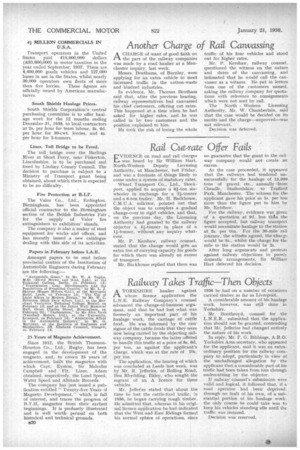Rail Cut-rate Offer Fails E VIDENCE on road and rail charges
Page 6

If you've noticed an error in this article please click here to report it so we can fix it.
was heard by SiWilliam Hart, North-Western Deputy Licensing Authority, at Manchester, last Friday, and was a foretaste of things likely to come under a system of statutory rates.
Wharf Transport Co., Ltd., Stockport, applied to acquire a 6i-ton sixwheeler in exchange for a 2-tanner and a 6-ton trailer. Mr.-1-1, Backhouse, C.M.U.A. solicitor, pointed out that the object was to complete a gradual change-over to rigid vehicles, and that, on the previous day, the Licensing Authority had granted to the railway objector a 41-tonner in place of a li-tonner, without any inquiry whatever.
Mr. P. Kershaw, railway counsel, stated that the change would give an extra ton of carrying capacity for goods for which there was already an excess of transport.
Mr. Backhouse replied that there was no guarantee that the grant to the railway company would not create ass excess.
As the case proceeded, it appeared that the railways had tendered unsuccessfully for the haulage of 13,000 tons of gravel, etc., annually ,from Cheadle, Staffordshire, to Trafford Park, Manchester. ' The witness for the applicant gave his price as Is. per ton more than the figure put to him by Mr. Kershaw.
For the railway, evidence was given of a quotation at 9d. less than the figure accepted, but railway transport
• would necessitate haulage to the station at 25. per tbn. For the 30-mile rail joihney, the witness agreed, the charge would be -5s., whilst the charge for the
• mile to the station would be 2s.
After long arguments and protests against railway objections in purely domestic arrangements, Sir William Hart deferred his decision.






























